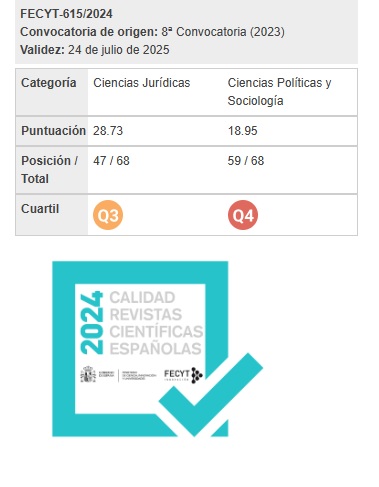La elección indirecta de segundo grado y la dinámica partidista
Frenos a la presencia equilibrada en las diputaciones provinciales en España
DOI:
https://doi.org/10.18042/cepc/IgdES.10.06Palabras clave:
Democracia; representación; igualdad; partidos políticos; provincia; diputaciones provincialesResumen
La provincia es pieza clave de la organización territorial en España desde hace dos siglos y el estudio de su configuración resulta de interés. La Constitución española de 1978 no realiza un tratamiento detallado de la provincia ni de su órgano de gobierno autónomo, las diputaciones, siendo su regulación tarea del legislador estatal. En particular, el sistema de elección de los miembros de las corporaciones provinciales se regula en la normativa electoral que establece las reglas de este procedimiento, a realizar tras la constitución de los ayuntamientos. La elección de los diputados provinciales es indirecta de segundo grado, lo que ha planteado dudas sobre la relación de representatividad de estos representantes; y en ella, el control de los partidos políticos es casi absoluto. La ausencia de obligación legal para elaborar candidaturas que incorporen el principio de presencia equilibrada, a diferencia de otro tipo de elecciones, provoca una infrarrepresentación de las mujeres en las diputaciones provinciales.
Descargas
Publicado
Cómo citar
Número
Sección
Licencia
Derechos de autor 2024 José Luis Mateos Crespo

Esta obra está bajo una licencia internacional Creative Commons Atribución-NoComercial-SinDerivadas 4.0.
Los firmantes conservarán sus derechos de autoría y garantizarán a la revista el derecho de primera publicación de su obra, el cual estará simultáneamente sujeto a la Licencia de reconocimiento de Creative Commons Reconocimiento-No comercial-Sin obra derivada 4.0 España que permite a terceros compartir la obra siempre que se indique su autor y su primera publicación esta revista.
También podrán adoptar otros acuerdos de licencia no exclusiva de distribución de la versión de la obra publicada (p. ej.: depositarla en un archivo telemático institucional o publicarla en un volumen monográfico) siempre que se indique la publicación inicial en esta revista.





